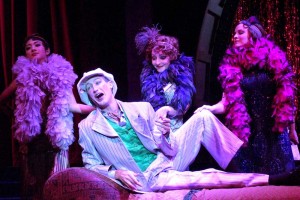Cabaret spellbinds audiences with story
When most people go to musical theatre, they expect frothy tunes, fluffy comedy and songs of hope and love. This is not the case with John Kander and Fred Ebb’s 1966 Cabaret, the newest production by the Reprise Theatre Company. From the first curtain to the last, the show swings between young love, hopeless love, hypocrisy, loss and the rise of the Nazi party.

Show stoppers · Dodge’s interpretation of Cabaret is entertaining and enthralling, but it is the cast that truly makes the show with intriguing backstories and independent and self-fulfilling roles. - Photo courtesy of Ed Krieger
As a musical, Cabaret walks a fine line between telling a story and becoming lost in its own metaphor. This production, however, tips its hat to historical authenticity to create a show that’s moving, salacious and chillingly human.
The show begins with the tuxedo-clad Master of Ceremonies (Bryce Ryness) welcoming the audience to 1930s Berlin and to the Kit Kat Klub, a kinky cabaret where those not crippled by Germany’s depression come to enjoy drinks, boys and girls — often simultaneously.
American novelist Cliff Bradshaw soon arives (Jeff McLean), looking for artistic inspiration. What he finds is Sally Bowles (Lisa O’Hare), a decadent stage kitten with delusions of grandeur.
The two become roommates under the roof of world-weary, scrappy spinster Fräulein Schneider (Mary Gordon Murray) and neighbors to the pragmatic call-girl Fräulein Kost (Katrina Lenk). Fräulein Schneider has her own budding romance with the gentle Jewish fruit vendor Herr Shultz (Robert Picardo), who lavishes her with pineapples and schnapps.
It seems like a happy, dysfunctional family. Except it’s also the rise of Nazi Germany and things are quickly going to hell in a hand basket.
One might complain the Kit Kat Klub looks too pretty. After all, 1930s Germany was in a staggering depression and entertainment was cheap and tacky, as the Broadway revival suggested. However, Berlin always had people with money — some people who even saw a looming crisis and eagerly spent money on lavish entertainment while they still could.
The Kit Kat Club’s glittering set pieces and stylish dance numbers reflect this higher clientele. Instead of gyrating to jaunty tunes, the dancers spin a wicked Charleston, sometimes while locked in a passionate kiss.
Director and choreographer Marcia Milgrom Dodge, who earned seven Tony nominations for Ragtime in 2010, makes Cabaret a world rather than a stage piece. Her songs are big and glitzy, from the opening “Wilkommen” to hilariously tawdry “Two Ladies.”
Dodge crafts a great blueprint but it’s the cast that brings the story to life. McClean’s Cliff is a strikingly innocent boy — he’s idealistic, tender, a tad mischievous and a bit of a dork. When he starts to realize the darkness of the world around him he holds nothing back. His helpless rage is heartbreaking.
Meanwhile, O’Hare’s Sally is ridiculous and charming by turns. Sally appears to live off gin and dancing but as the show goes on it seems her cocktails and fur coat are the only things between her and a complete breakdown. Her titular song “Cabaret” is a desperate cry to decadence and embraced destruction.
The Emcee plays a dozen roles including a performer, a host and a Puckish commentator. Ryness shines in all of them.
The Emcee is clownish and sinister all at once. His big number “Money Money” is a sarcastic celebration of capitalism as the ensemble swings giant money bags. His softer “I Don’t Care Much” harkens to the cold disillusionment felt both by Sally and the downtrodden people of the Weimar Republic — the ones who would later stand by as Nazis shipped off their Jewish neighbors to concentration camps. Yet unlike in some productions, he remains very much a real character, as seen during “Tomorrow Belongs to Me” when he bemusedly walks in on a future Nazi anthem song.
Rounding out the strong cast is the ensemble — watch closely and one sees each is a main character the spotlight only glances upon.
The production does not give into the siren song of the Nazi motif. Instead of losing itself in Nazi regalia, this production remains loyal to its characters. Ultimately it’s their stories. The show uses brilliant little touches, such as the Emcee walking around in a casual robe one morning, to remind us that the characters exist for themselves, not just pieces in an anti-fascist metaphor.
But when the Nazism impacts the story, it’s shocking and cruel. Here the Nazis are not nameless boogeymen but people who see themselves as the builders of a new Germany — as well as an ensemble one has grown attached to. When Cliff’s charismatic German friend suddenly sports a swastika, it’s a punch to the gut.
Theatre exists to entertain but it can also be a harbinger of social commentary. A loaded political climate can exist in any era, including now. The Reprise Theatre’s production of Cabaret is flashy and funny, but it is also powerful and sardonic. At the very least it feels authentic and that always makes for compelling stagecraft.
The Reprise Theatre Company’s production of Cabaret plays at UCLA’s Freud Playhouse through Sept. 25. Tickets can be purchased from the UCLA Central Ticket Office by calling (310) 825-2101.
